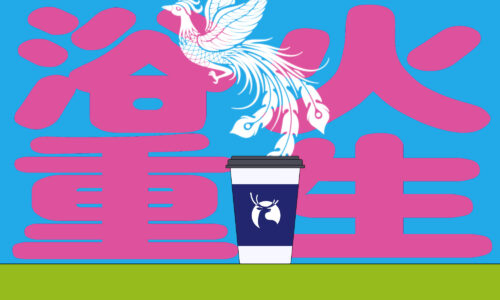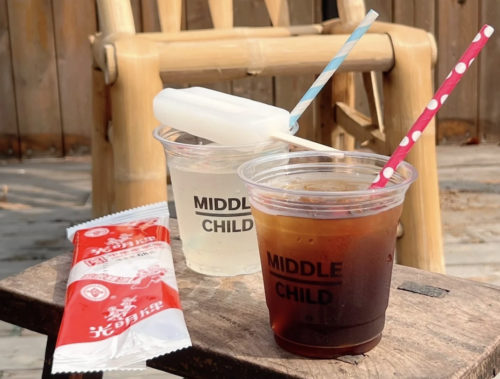Luckin overtakes Starbucks in China sales for first time — thanks to ‘pseudo’ coffee
In racing past Starbucks, Luckin has not only dethroned a foreign brand that’s been synonymous with coffee for more than two decades in China, it has also declared a new chapter of its business as it tries to move on from its scandal-riddled past.

China’s homegrown beverage chain Luckin Coffee has for the first time eclipsed global coffee juggernaut Starbucks in domestic sales, according to industry and corporate reports, a milestone propelled largely by its aggressive expansion in the past year and diversified offerings tailored to Chinese people who are averse to the bitter taste of traditional coffee.
From April to June 2023, the Xiamen-headquartered company earned 6.2 billion yuan ($862 million), marking a 88% jump compared with the same period a year ago, per Luckin’s quarterly revenue report released last week.
By contrast, for Starbucks, which reported its sales results around the same time, while its same-store sales — or sales at locations open at least a year — soared 51% year-over-year in the three months that ended on July 2, its net income for the period stood around 5.9 billion yuan ($820 million), marking the first time ever that the company has fallen second behind its local competitor in single-quarter earnings.
One pandemic, two tales
During a conference with investors last week, Starbucks CEO Laxman Narasimhan said that the sales growth in China — the world’s second-biggest economy — was mainly powered by the government’s removal of COVID-zero policies in December, which allowed the company to reopen some of its locations and coffee drinkers to resume their morning routines as they returned to the office.
Last year, as a flurry of lockdowns continued to confine millions of Chinese people to their homes and forced businesses to remain shuttered, Starbucks sales plummeted in the country, with Shanghai, the company’s largest market, suffering the largest dip in earnings due to a two-month lockdown.
But the pandemic painted an entirely different picture for Luckin Coffee. Because its business model depends heavily on takeout and delivery, with most of its stores offering limited seating, Luckin managed to keep its sales largely unaffected despite challenging COVID policies. As a result, Luckin reported an annual sale of 13.2 billion yuan ($1.84 billion) and achieved its first-ever full-year profitability in 2022.
Aside from sales numbers, Luckin has also surpassed Starbucks in store count in China. In June, after opening 1,137 mainland China locations in the first quarter of this year, Luckin reached its 10,000-store milestone with its first flagship outlet in Xiamen. In comparison, Starbucks currently operates around 6,000 locations in over 230 Chinese cities.
“Because Luckin’s store formats are so different from your typical sit-down Starbucks, sure they could easily go for a lot more stores,” Rui Ma, the chief operating officer at AlphaWatch AI and founder of Tech Buzz China, explained to The China Project.
A Nasdaq comeback story for Luckin?
In racing past Starbucks, Luckin has not only dethroned a foreign brand that’s been synonymous with coffee for more than two decades in China, it has also declared a new chapter of its business as it tries to move on from its scandal-riddled past.
Founded in 2017 as a hip, budget-friendly alternative to traditional coffeehouses like Starbucks, Luckin vaulted itself into the Chinese coffee scene rapidly through major giveaways and unmatched discounts. Once hailed by investors as one of China’s top “unicorns,” Luckin made a grand debut on New York’s Nasdaq stock exchange in 2019 through a $600 million IPO.
But in less than a year, the Chinese coffee chain was forced to delist after admitting that its earnings had been exaggerated. As part of the fallout, the company fired both its chairman and CEO, and paid a penalty of $180 million to settle the accounting fraud charges with the U.S. Securities and Exchange Commission.
Since then, Luckin has been trying to restore its reputation. After reports of its sales growth last year, Luckin’s new CEO Guō Jǐnyī 郭谨一 acknowledged that some analysts were skeptical of the company’s financial results given the $300 million accounting scandal. “We have taken a lot of measures to clean up our own house,” Guo said in an interview, adding that Luckin had brought in external lawyers to review its operations and reorganized its teams.
In January, the Financial Times reported that Luckin was exploring whether it should relist its shares in the U.S., possibly as soon as the end of this year. The news of Luckin overtaking Starbucks in China sales will likely bolster optimism and accelerate the process, but Ma said she wasn’t sure if the Chinese company “really needs to be in a hurry to relist.”
“Being on the over-the-counter market hasn’t necessarily hurt their market cap as much as one would have thought, though of course it probably does prevent the more established, conservative firms from investing in them,” she added.
Cheap and sweet
According to local media reports, there are a host of factors contributing to Luckin’s accelerated growth in the post-pandemic world. But above all, it’s the competitive pricing that wins the day for the Chinese coffee chain, as local consumers have to tighten their purse strings in the face of economic headwinds.
Doubling down on its pricing strategy, Luckin launched a month-long promotion in June centered around 9.9 yuan ($1.38) coffee drinks. In the first week of the campaign, the company sold over 39 million caffeine beverages. Throughout the month, the promotion brought in more than 50 million customers for Luckin.
Starbucks, on the other hand, maintained its premium image, with most of its products priced above 30 yuan ($4.7).
China’s coffee consumption has come a long way in the past three decades. Until the 1990s, java was rarely served in the country except at high-end hotels targeting foreigners. In 1999, when Starbucks opened its first store in mainland China in Beijing, it was a risky move for the international coffee giant to introduce a new source of caffeine to a nation of people who had been drinking tea for centuries.
In recent years, while coffee has gained widespread popularity among urban, young professionals, leading some analysts to predict that the country’s market for the beverage will exceed 200 billion yuan ($27.8 billion) in 2024, the habit is still nascent. Currently, coffee consumption per capita in the country is only five cups per year, according to industry sources. This compares to 363 cups per person in the U.S. and 300 cups for South Koreans.
For self-claimed coffee enthusiasts in China, there’s also room for debate over whether what they like to consume is truly coffee, Ma said, noting that popular coffee items at Chinese Luckin and Starbucks stores should be better described as “sugary mixed drinks with some coffee.”
Citing industry insiders, Ma pointed out that in the second half of 2022, coffee-based drinks only accounted for 60 percent of sales for Luckin. Of those, “five drinks made up for about 75 percent of the revenues, and four out of five are mixed drinks,” like coconut coffee, the chain’s flagship beverage.
“These drinks are all sugary and caffeinated,” Ma said. “While direct black coffee consumption isn’t very high, there is clearly a high preference for caffeine.”






